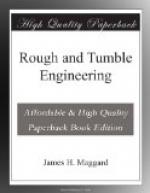You may ask “how am I to know when I am getting a good grade of oil.” The best way is to ascertain a good brand of oil then use that and nothing else.
We are not selling oil, or advertising oil. However before I get through I propose to give you the name of a good brand of cylinder oil, a good engine oil as well as good articles of various attachments, which cut no small figure in the success you may have in running an engine.
It is not an uncommon thing for an engineer (I don’t like to call him an engineer either) to fill his sight feed lubricator with ordinary engine oil, and then wonder why his cylinder squeaks. The reason is that this grade of oil cannot stand the heat in the cylinder or steam chest.
If you are carrying 90 pounds of steam you have about 320 degrees of heat in your cylinder, with I20 to I25 pounds you will have about 350 degrees of heat, and in order to lubricate your valve and valve-seat, and also the cylinder surface, you must use an oil, that will not only stand this heat but considerable more so that it will have some staying qualities.
Then if you are using a good quality of oil and your link or reverse begins to knock, it is because some part of it wants attention, and you must look after it. And here is where I want to insist that you teach your ear to be your guide. You ought to be able to detect the slightest sound that is unnatural to your engine. Your eyes may be deceived, but a well trained ear can not be fooled.
I was once invited by an engineer to come out and see how nice his engine was running. I went, and found that the engine itself was running very smooth, in fact almost noiseless, but he looked very much disappointed when I asked him why he was doing all his work with one end of cylinder. He asked me what I meant, and I had some difficulty in getting him to detect the difference in the exhaust of the two ends, in fact the engine was only making one exhaust to a revolution. He was one of those engineers who never discovered anything wrong until he could see it. Did you know that there are people in the world whose mental capacity can only grasp one idea at a time. That is when their minds are on any one object or principle they can not see or observe anything else. That was the case with this engineer, his mind had been thoroughly occupied in getting all the reciprocating (moving) parts perfectly adjusted, and if the exhaust had made all sorts of peculiar noises, he would not have discovered it.
The one idead man will not make a successful engineer. The good engineer can stand by and at a glance take in the entire engine, from tank to top of smoke stack. He has the faculty of noting mentally, what he sees, and what he hears, and by combining the results of the two, he is enabled to size up the condition of the engine at a glance. This, however, only come with experience, and verges on expertness. And if you wish to be an expert, learn to be observing.




